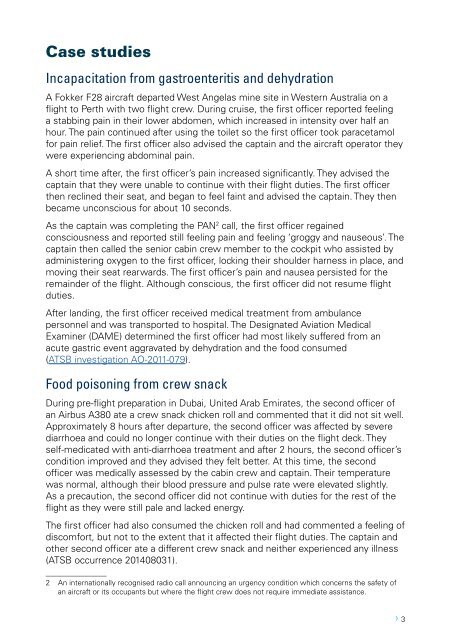Pilot incapacitation occurrences 2010–2014
8rKXy6YKY
8rKXy6YKY
You also want an ePaper? Increase the reach of your titles
YUMPU automatically turns print PDFs into web optimized ePapers that Google loves.
Case studies<br />
Incapacitation from gastroenteritis and dehydration<br />
A Fokker F28 aircraft departed West Angelas mine site in Western Australia on a<br />
flight to Perth with two flight crew. During cruise, the first officer reported feeling<br />
a stabbing pain in their lower abdomen, which increased in intensity over half an<br />
hour. The pain continued after using the toilet so the first officer took paracetamol<br />
for pain relief. The first officer also advised the captain and the aircraft operator they<br />
were experiencing abdominal pain.<br />
A short time after, the first officer’s pain increased significantly. They advised the<br />
captain that they were unable to continue with their flight duties. The first officer<br />
then reclined their seat, and began to feel faint and advised the captain. They then<br />
became unconscious for about 10 seconds.<br />
As the captain was completing the PAN 2 call, the first officer regained<br />
consciousness and reported still feeling pain and feeling ‘groggy and nauseous’. The<br />
captain then called the senior cabin crew member to the cockpit who assisted by<br />
administering oxygen to the first officer, locking their shoulder harness in place, and<br />
moving their seat rearwards. The first officer’s pain and nausea persisted for the<br />
remainder of the flight. Although conscious, the first officer did not resume flight<br />
duties.<br />
After landing, the first officer received medical treatment from ambulance<br />
personnel and was transported to hospital. The Designated Aviation Medical<br />
Examiner (DAME) determined the first officer had most likely suffered from an<br />
acute gastric event aggravated by dehydration and the food consumed<br />
(ATSB investigation AO-2011-079).<br />
Food poisoning from crew snack<br />
During pre-flight preparation in Dubai, United Arab Emirates, the second officer of<br />
an Airbus A380 ate a crew snack chicken roll and commented that it did not sit well.<br />
Approximately 8 hours after departure, the second officer was affected by severe<br />
diarrhoea and could no longer continue with their duties on the flight deck. They<br />
self-medicated with anti-diarrhoea treatment and after 2 hours, the second officer’s<br />
condition improved and they advised they felt better. At this time, the second<br />
officer was medically assessed by the cabin crew and captain. Their temperature<br />
was normal, although their blood pressure and pulse rate were elevated slightly.<br />
As a precaution, the second officer did not continue with duties for the rest of the<br />
flight as they were still pale and lacked energy.<br />
The first officer had also consumed the chicken roll and had commented a feeling of<br />
discomfort, but not to the extent that it affected their flight duties. The captain and<br />
other second officer ate a different crew snack and neither experienced any illness<br />
(ATSB occurrence 201408031).<br />
2 An internationally recognised radio call announcing an urgency condition which concerns the safety of<br />
an aircraft or its occupants but where the flight crew does not require immediate assistance.<br />
› 3


